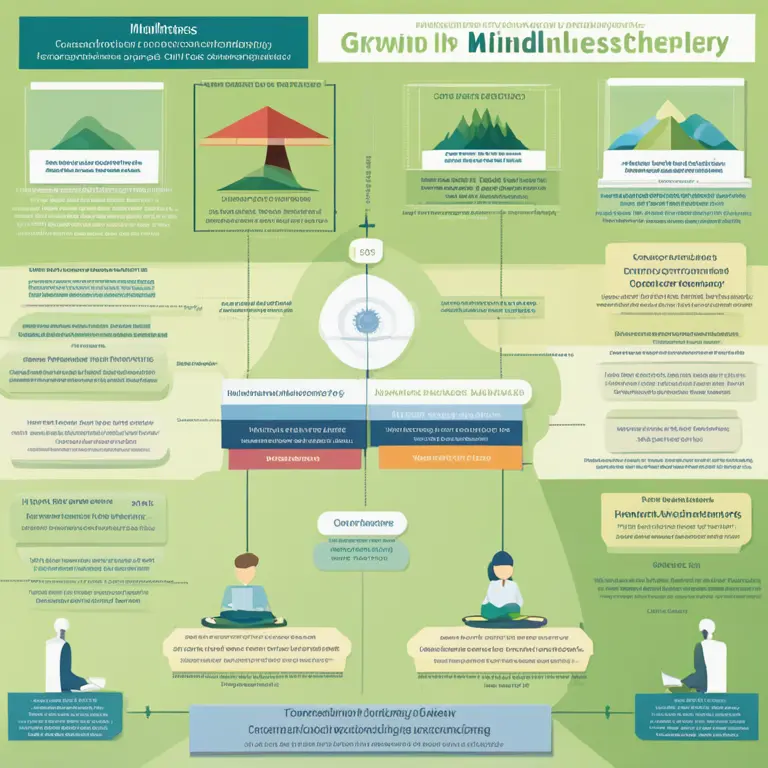
Integrating Meditation, Mindfulness, and Psychotherapy
Delve into the synergy between meditation, mindfulness, and psychotherapy, and how this triad forms a holistic approach to mental health and well-being.
article by Hina Kurosawa
The Synergistic Trio
In the realm of mental health and personal growth, a groundbreaking synergy has emerged: the integration of meditation, mindfulness, and psychotherapy. Before diving into how these techniques interrelate, it's paramount to understand their individual contributions to our wellbeing. Meditation is a time-honored practice that encourages deep reflection and mental serenity. Mindfulness, a core component of many meditation practices, is the art of maintaining a moment-by-moment awareness of our thoughts, feelings, and environment. Psychotherapy, meanwhile, is a therapeutic interaction or treatment contracted between a trained professional and a client, patient, family, couple, or group.

Mindfulness in Modern Psychotherapy
The role of mindfulness in psychotherapy is becoming increasingly prominent. Mental health professionals recognize the profound impact that being present and fully engaged in the here and now has on an individual's psychological health. Mindfulness-based cognitive therapy (MBCT) and mindfulness-based stress reduction (MBSR) are two exemplary modalities that utilize mindfulness principles to address conditions such as depression and anxiety. These practices have been supported by a growing body of scientific research which endorses their efficacy.

Meditation as a Therapeutic Tool
Meditation has evolved from a spiritual practice into a therapeutic tool advised by psychotherapists. By inducing a state of relaxation and promoting stress reduction, meditation can serve as a powerful adjunct to traditional psychotherapy sessions. Techniques like guided imagery and focused attention have been shown to reduce symptoms of psychiatric disorders, enhance coping strategies, and improve overall emotional resilience.

Challenges and Considerations
The integration of meditation and mindfulness into psychotherapy does not come without its challenges. Therapists must be adequately trained in these practices to ensure they are delivering them safely and effectively. Furthermore, it is essential to consider the unique cultural and personal beliefs of each client to prevent conflict with their existing values. A tailored approach that respects individual differences is paramount to the success of this triad in psychotherapy.

Evidence-Based Outcomes
As we advance into 2024 and beyond, the evidence supporting the confluence of psychotherapy with meditation and mindfulness is compelling. Studies have consistently shown that when these practices are incorporated into treatment plans, they can lead to significant improvements in various mental health outcomes. More than ever, mental health professionals are advocating for holistic approaches that address not only the mind but also the body and spirit.
Conclusion: A Collective Way Forward
The fusion of meditation, mindfulness, and psychotherapy heralds a new dawn in mental healthcare. This collective approach promotes a more nuanced understanding of the human psyche, encouraging patients to embrace a full spectrum of therapeutic techniques. As society continues to wrestle with complex mental health challenges, this integrated method of treatment is paving the way for more comprehensive, compassionate care that is in line with the evolving demands of our time.
Published: 1/18/2024
Modified: 1/18/2024
More predictions
Come back here soon to learn more about yourself and your future


Mindfulness Meditation As A Tool for Anxiety Relief
Discover how mindfulness meditation can be a powerful tool for anxiety relief, fostering a sense of peace and well-being through simple, guided practices.


Mastering The Path Of Mindfulness Meditation
Discover the serene path of mindfulness meditation with this comprehensive guide designed to help you find inner peace and clarity.


Mindful Teaching: Meditation Practices for Educators
Discover the benefits of mindfulness meditation for educators seeking balance, enhanced concentration, and emotional wellbeing in a demanding profession.